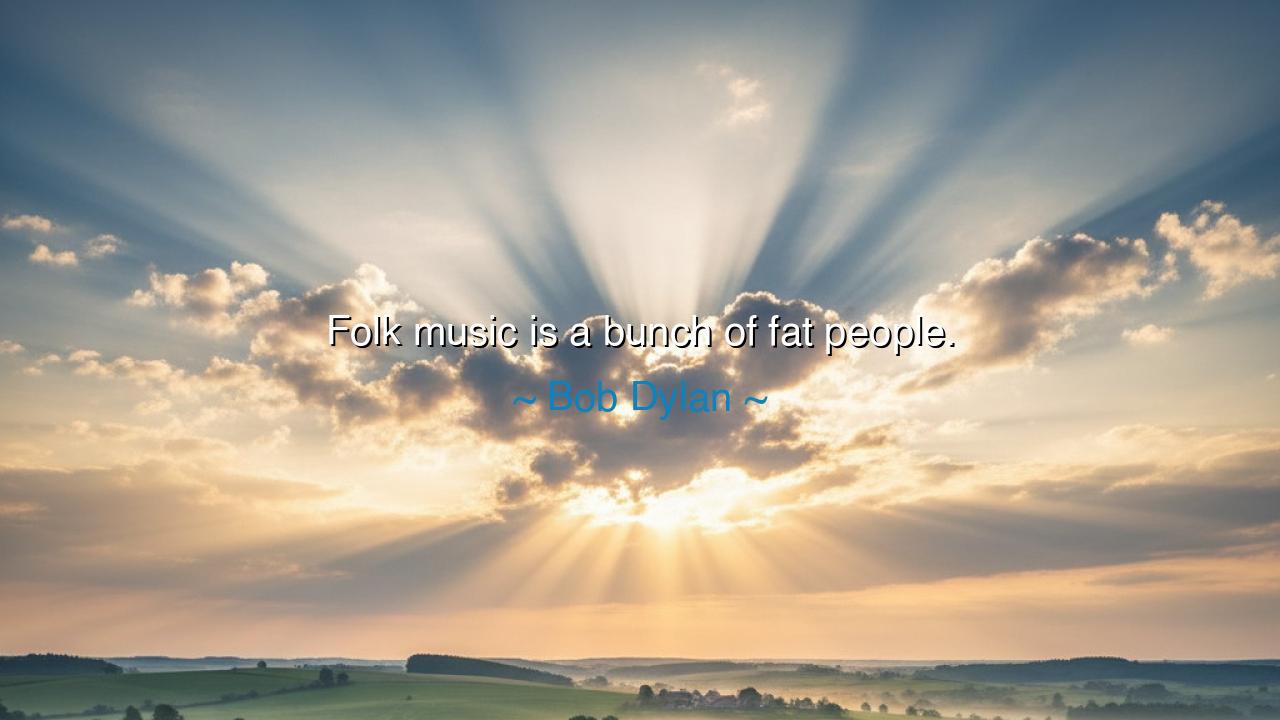
Folk music is a bunch of fat people.






“Folk music is a bunch of fat people.” Thus spoke Bob Dylan, trickster-poet, prophet of song, whose tongue was as sharp as his pen. His words, though cloaked in jest and provocation, bear the mark of deeper wisdom. For Dylan was never content with the comfortable, the stagnant, or the self-satisfied. When he spoke of folk music as “a bunch of fat people,” he did not mean flesh alone—he meant complacency, the weight of tradition when it grows too heavy, the danger of art becoming bloated, content with itself, and unwilling to move forward.
The ancients warned of this very thing. They said that every flame, if not tended, becomes smoke. Every river, if not flowing, becomes stagnant. So too with music, or with any art. In Dylan’s time, folk music had become revered as pure, traditional, and sacred. But to Dylan’s restless soul, that reverence became a cage. He saw in its guardians not lean hunger but overfed pride, a circle content to sing the old songs while the world outside burned with new voices. To call them “fat” was to strip away their pretension and remind them that art must remain alive, restless, and lean with hunger for truth.
In 1965, Dylan himself broke from the folk tradition at Newport by plugging in his guitar, unleashing electric sound where only acoustic purity had been welcome. The crowd booed, some in rage, some in betrayal, for to them, folk music was holy. Yet Dylan’s act was not betrayal—it was evolution. He shattered complacency and dared to move forward. His biting remark about “fat people” was the spirit of this act: a refusal to let art grow soft, a call to strip it of excess and let it burn raw and alive once more.
History mirrors this in other realms. Consider Galileo, who defied the bloated certainty of his age by declaring that the earth moved around the sun. Or consider the Impressionists, who rejected the stagnant weight of the academies and painted light itself upon their canvases. Each was accused of heresy, yet each was simply cutting away the fat of tradition to reveal a leaner, truer vision. Dylan’s quip belongs to this same lineage of rebels who mocked the old in order to make way for the new.
The lesson is clear: beware of comfort in your art, in your work, in your life. When you find yourself bloated with repetition, content with the applause of like-minded circles, ask yourself: am I still hungry? Am I still lean, still seeking? Or have I grown like those Dylan mocked—heavy not in body, but in spirit, weighed down by pride and nostalgia? True art, true living, demands restlessness, a willingness to evolve even when others call it betrayal.
O seekers of wisdom, take this teaching to heart. Do not despise tradition, but do not let it make you lazy. Honor the old songs, but do not be afraid to write new ones. Respect the past, but do not worship it so much that you are too heavy to move. For the world changes, and only those willing to break from comfort can shape the new age. Dylan’s words sting because they are true: stagnation is fatness, and the artist must always stay lean, burning with hunger for what lies beyond.
In practice, this means daring to step outside your circle of approval. If you are an artist, create what unsettles even your closest allies. If you are a thinker, question what has been handed down as unquestionable truth. If you are a leader, do not cling to the past, but look boldly to the future. To live lean is to live alive. To live bloated is to die while still breathing.
Thus Dylan’s mocking wisdom endures: “Folk music is a bunch of fat people.” It is not condemnation of flesh, but of complacency. It is a call to strip away excess, to remain restless, to stay hungry for the fire of creation. For in hunger lies vitality, and in vitality lies the power to awaken the world.






AAdministratorAdministrator
Welcome, honored guests. Please leave a comment, we will respond soon